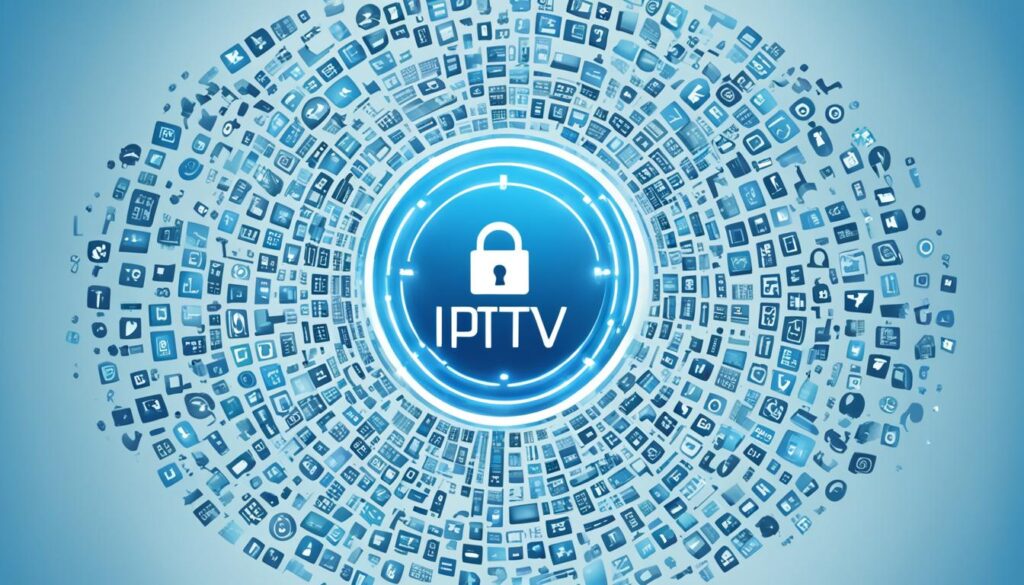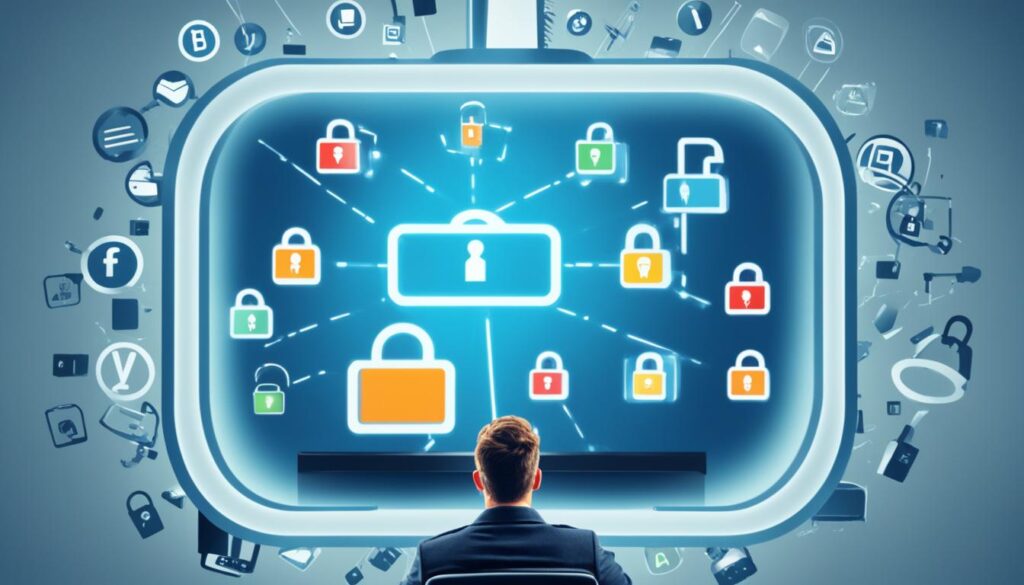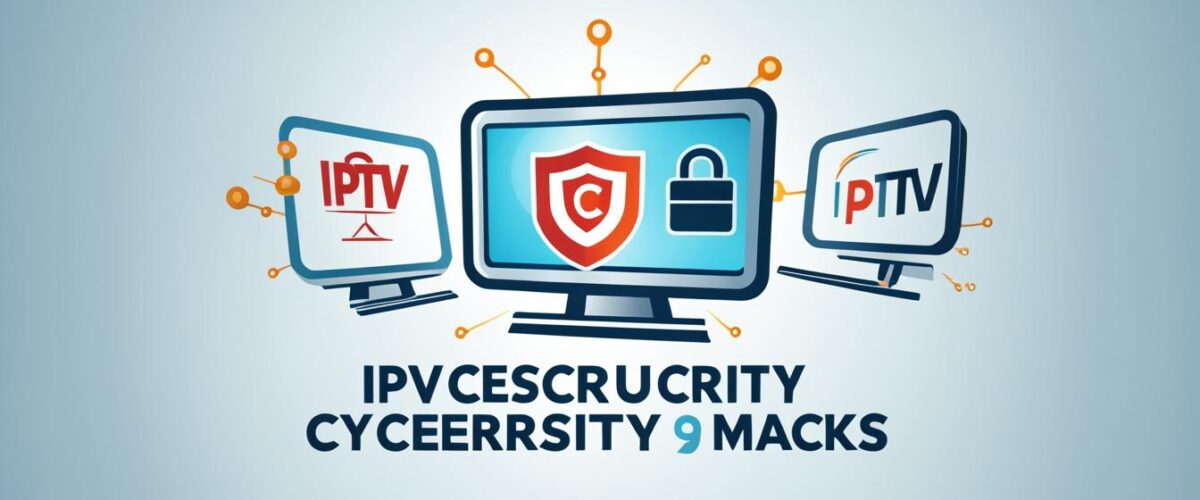Did you know that the global IPTV market is projected to reach a staggering revenue of $117.07 billion by 2025? With the increasing popularity of IPTV services, it’s crucial to prioritize cybersecurity to protect user data and maintain privacy.
In this article, we will explore the risks of data breaches and unauthorized access in IPTV systems and provide insights into essential security best practices. By understanding and implementing these measures, IPTV providers can safeguard their infrastructure and ensure a secure streaming experience for users.
Key Takeaways:
- Protecting user data and maintaining privacy is essential in the growing IPTV market.
- IPTV systems face risks such as data breaches, unauthorized access, and cybersecurity threats.
- Encryption, secure authentication, network security measures, and regular software updates are key cybersecurity best practices for IPTV.
- IPTV services collect and store user data, raising concerns about data privacy.
- Choosing reputable IPTV providers and using secure networks are critical for ensuring a secure streaming experience.
Understanding IPTV Security Risks
As the popularity of IPTV (Internet Protocol Television) continues to grow, it’s important to be aware of the security risks involved. While IPTV offers numerous benefits, including a wide range of entertainment options and convenience, it also raises concerns about data privacy and cybersecurity.
IPTV systems collect and store user data, which can include personal information and viewing habits. The **risks of data breaches in IPTV** expose users to potential unauthorized access to sensitive information. This can lead to various detrimental consequences, such as data theft, identity fraud, and financial losses.
Furthermore, **cybersecurity threats in IPTV** pose significant risks to both users and service providers. Malware, phishing attacks, and hacking attempts can exploit vulnerabilities in IPTV systems, compromising user data and compromising the integrity of the entire infrastructure. These threats can have severe consequences not only for individuals but also for businesses operating in the IPTV industry.
The importance of IPTV data privacy
One of the main concerns regarding IPTV is **IPTV data privacy**. With data being collected and stored, users may worry about how their personal information is being used and protected. Steps must be taken to ensure data privacy, giving users confidence that their information is secure and not misused.
A robust data protection framework should be in place to safeguard user data and provide transparency about how the data is used. Implementing data encryption measures, access controls, and secure data storage practices are some ways to address data privacy concerns in IPTV systems.
Guarding against cybersecurity threats
Protecting IPTV systems from **cybersecurity threats in IPTV** requires a multi-faceted approach. Service providers should invest in robust network security measures to prevent unauthorized access and protect user data. This includes implementing firewalls, intrusion detection systems, and virtual private networks.
Additionally, regular software updates and patch management are essential to address security vulnerabilities and protect against newly emerging threats. By staying vigilant and proactive in identifying and mitigating potential risks, IPTV providers can enhance the security of their systems.
Summary of IPTV security risks
In summary, understanding the **risks of data breaches in IPTV** and being aware of the **cybersecurity threats in IPTV** helps users and service providers take proactive steps to mitigate these risks. By prioritizing data privacy, implementing robust security measures, and staying up-to-date with the latest security protocols, IPTV systems can provide a safer and more secure streaming experience for all.
| Security Risks | Potential Consequences |
|---|---|
| Data breaches | Data theft, identity fraud, financial losses |
| Cybersecurity threats | Malware, phishing attacks, hacking attempts |
| Data privacy concerns | Unauthorized access, misuse of personal information |
Essential Security Best Practices
When it comes to ensuring IPTV cybersecurity, implementing essential security best practices is paramount. By prioritizing encryption, secure authentication mechanisms, IPTV network security, and regular software updates, IPTV providers can enhance the security and protect user data. Let’s explore these best practices in detail:
IPTV Encryption Technologies
One of the foundations of IPTV security is encryption. By encrypting user data, IPTV providers can make it inaccessible to unauthorized individuals or hackers. Robust encryption technologies, such as AES (Advanced Encryption Standard), are commonly employed to secure IPTV systems. Encryption ensures that user data remains confidential and protected from potential threats.
Secure Authentication Mechanisms
Secure authentication mechanisms play a crucial role in preventing unauthorized access to IPTV accounts. One commonly utilized mechanism is two-factor authentication (2FA), which requires users to provide an additional layer of verification, such as a unique code sent to their mobile devices. Implementing 2FA adds an extra barrier against unauthorized login attempts, enhancing IPTV security.
IPTV Network Security
Securing the IPTV network infrastructure is essential to prevent unauthorized access to sensitive data. IPTV providers employ various network security measures like firewalls and virtual private networks (VPNs) to protect the IPTV network from external threats. Firewalls help filter incoming and outgoing traffic, while VPNs create encrypted connections, ensuring secure data transmission over the network.
Regular Software Updates
Regular software updates for IPTV systems are critical to maintaining a secure environment. By promptly applying software updates, IPTV providers address security vulnerabilities and ensure that their systems are protected against emerging threats. Patch management practices, including timely updates and staying informed about security advisories, are crucial to mitigating potential risks.
By following these essential security best practices, IPTV providers can enhance the security of their systems, protect user data, and provide a safe and secure streaming experience for their customers.

IPTV Data Privacy Concerns
As IPTV services gain popularity, concerns about data privacy and security have come to the forefront. IPTV platforms collect and store a significant amount of user data, which raises valid privacy concerns. Users worry about the risks of data breaches and unauthorized access to their personal information.
One of the main privacy concerns in IPTV is the collection of user data. Various information, such as viewing habits and personal preferences, is gathered and stored by IPTV providers. While this data collection allows for targeted content recommendations and personalized experiences, it also exposes users to potential risks.
The risks of data breaches and unauthorized access are serious issues that IPTV users should be aware of. With the increasing number of cyber threats targeting personal data, the data collected by IPTV services becomes a potential target for hackers and malicious actors. Unauthorized access to personal information can lead to identity theft, financial loss, and other harmful consequences.
To mitigate these risks, IPTV providers must prioritize data security and implement robust measures to protect user data. Strong encryption protocols, secure authentication mechanisms, and regular security audits are essential to safeguard user privacy in IPTV systems. By adopting these best practices, IPTV providers can instill confidence in their users and ensure a secure streaming experience.

| IPTV Data Privacy Concerns |
|---|
| Collection of user data |
| Risks of data breaches |
| Unauthorized access to personal information |
Cybersecurity Threats in IPTV
IPTV systems are not immune to cybersecurity threats. Users must be aware of the risks and take necessary precautions to protect themselves from potential harm. Some of the most common threats in IPTV include:
- Malware: Malicious software can infiltrate IPTV systems, compromising the security and integrity of user data. This includes viruses, adware, spyware, and ransomware that can cause data theft, financial losses, and other damaging consequences.
- Phishing Attacks: Phishing attacks target unsuspecting users, attempting to trick them into revealing sensitive information such as login credentials, credit card details, or personal identification. These attacks often come in the form of fraudulent emails, messages, or websites.
- Hacking Attempts: Hackers may attempt to gain unauthorized access to IPTV systems to steal user information, disrupt service, or engage in illegal activities. They exploit vulnerabilities in network infrastructure or user devices to carry out their malicious intentions.
These cybersecurity threats pose significant risks to IPTV users. They can result in data breaches, identity fraud, financial losses, and other detrimental consequences. Therefore, it is essential for users to remain vigilant and adopt preventive measures to minimize the likelihood of falling victim to these threats.

The Impact of Cybersecurity Threats in IPTV
The consequences of cybersecurity threats in IPTV can be far-reaching and devastating. Here are some key impacts:
| Impact | Description |
|---|---|
| Data Theft | Cybercriminals can steal personal information, financial data, and other sensitive details, which can be used for fraudulent activities or sold on the dark web. |
| Identity Fraud | Stolen personal information can be utilized to impersonate users, leading to identity theft, unauthorized account access, and potential legal and financial liabilities. |
| Financial Losses | Phishing attacks, ransomware, or unauthorized transactions can result in direct financial losses for IPTV users. |
| Disruption of Service | Hacking attempts can overload servers, causing service disruptions, buffering, and unstable connections for IPTV users. |
| Damage to Reputation | A security breach in an IPTV system can lead to a loss of trust and credibility, impacting the reputation of the service provider. |
To mitigate these risks, IPTV users should implement robust security measures and follow cybersecurity best practices. This includes using reliable antivirus software, practicing good password hygiene, remaining cautious of suspicious emails or messages, and keeping devices and software up to date.
IPTV Encryption and Data Protection
When it comes to IPTV systems, ensuring the security of user data is of utmost importance in preventing unauthorized access and preserving user privacy. One crucial measure in achieving this is IPTV data encryption. By encrypting user data, IPTV providers can safeguard sensitive information from falling into the wrong hands.
There are various encryption protocols for IPTV that are utilized to establish end-to-end security in IPTV systems. These protocols employ sophisticated algorithms and techniques to encode user data, making it unreadable to unauthorized individuals.
By implementing IPTV data encryption, providers can mitigate the risks of data breaches and unauthorized access, ensuring that user information remains protected throughout the streaming process. Encryption not only provides a higher level of security for users but also contributes to building trust and confidence in the IPTV service.
Importance of Data Protection in IPTV
With the increasing prevalence of cyber threats, it is crucial to prioritize data protection in IPTV systems. The potential consequences of data breaches and unauthorized access can be severe, ranging from identity theft to financial losses.
By focusing on data protection, IPTV providers can demonstrate their commitment to user privacy and security. This not only attracts more users but also establishes a positive reputation in the industry. Users can have peace of mind knowing that their personal information is protected while enjoying their favorite IPTV content.
The Role of Encryption Protocols in IPTV
Encryption protocols play a vital role in securing IPTV systems and preventing unauthorized access to user data. These protocols ensure that data exchanged between users and the IPTV service is unreadable and incomprehensible to any third parties attempting to intercept or access it.
There are several encryption protocols commonly used in IPTV, including:
| Encryption Protocol | Benefits |
|---|---|
| Advanced Encryption Standard (AES) | Strong encryption algorithm widely adopted in various industries. |
| Transport Layer Security (TLS) | Ensures secure communication and data exchange over networks. |
| Secure Real-Time Transport Protocol (SRTP) | Designed specifically for securing real-time multimedia communication. |
These encryption protocols, combined with proper key management practices, ensure that IPTV systems maintain a high level of data protection and security.

Secure Authentication Mechanisms for IPTV
When it comes to ensuring the security of IPTV accounts, secure authentication mechanisms play a crucial role. By implementing strong authentication measures, IPTV providers can significantly reduce the risk of unauthorized access and protect user data. Two-factor authentication and the use of strong passwords are effective strategies in achieving this.
Two-Factor Authentication
Two-factor authentication adds an extra layer of security to IPTV accounts by requiring users to provide two pieces of evidence to verify their identity. This commonly involves a combination of something the user knows (such as a password) and something the user possesses (such as a unique code sent to their mobile device).
By incorporating two-factor authentication into IPTV systems, providers can effectively thwart most unauthorized access attempts. Even if an attacker manages to obtain a user’s password, they would still need access to the second factor (e.g., the mobile device) to gain entry to the account. This significantly strengthens the security posture of IPTV platforms.
Importance of Strong Passwords
Another vital aspect of secure authentication in IPTV is the use of strong passwords. Weak or easily guessable passwords can make accounts vulnerable to brute-force attacks or unauthorized password guessing. It is crucial to educate users about the importance of creating strong passwords and provide guidelines for password creation.
Strong passwords typically consist of a combination of upper and lower case letters, numbers, and special characters. Encouraging users to avoid using easily guessable information such as birthdates or common words can significantly enhance the security of their IPTV accounts.
Additionally, IPTV providers should implement password strength meters or enforce password complexity requirements during the account creation or password reset processes.
Remember, it is essential for users to avoid reusing passwords across multiple platforms. This practice reduces the risk of compromise if one account’s password is exposed.
Regular Updates of Authentication Mechanisms
As threats and attack techniques evolve, it is crucial to regularly update authentication mechanisms within IPTV systems. This allows providers to address emerging security vulnerabilities and stay one step ahead of potential attackers.
By partnering with cybersecurity experts, IPTV providers can continuously evaluate and update their authentication mechanisms to ensure the highest level of security for their users. Regular monitoring of the authentication framework, along with prompt patching or upgrading, helps maintain a robust and resilient IPTV security infrastructure.
| Secure Authentication Mechanisms for IPTV | Benefits |
|---|---|
| Two-Factor Authentication |
|
| Strong Passwords |
|
| Regular Updates of Authentication Mechanisms |
|
IPTV Network Security Measures
When it comes to protecting IPTV systems from unauthorized access and external threats, network security measures play a crucial role. By implementing robust security measures, IPTV providers can ensure the safety of user data and enhance the overall security of their networks.
Firewalls
Firewalls act as a protective barrier between an IPTV network and external networks, filtering incoming and outgoing traffic based on predefined security rules. They help prevent unauthorized access and block potential threats from reaching the IPTV system. Firewalls are an essential component of network security and provide an added layer of defense against cyber attacks.
Intrusion Detection Systems (IDS)
Intrusion Detection Systems (IDS) are designed to detect and respond to suspicious or malicious activities within the IPTV network. By monitoring network traffic and analyzing patterns, IDS can identify potential threats in real-time. This allows for immediate action to mitigate security incidents and prevent potential breaches.
Virtual Private Networks (VPN)
A Virtual Private Network (VPN) creates a secure and encrypted connection between the user’s device and the IPTV network. By routing traffic through a VPN, users can access IPTV content securely, even when connecting to public or untrusted networks. VPNs provide an additional layer of privacy and protect against unauthorized access to sensitive user information.
Network Monitoring and Threat Detection
Network monitoring tools enable IPTV providers to monitor network traffic and detect any abnormal or suspicious activities. By continuously analyzing network data and patterns, providers can identify potential threats and take immediate action to mitigate them. In addition, threat detection mechanisms help in identifying and responding to security incidents in real-time, minimizing the impact of cyber attacks on the IPTV network.
By implementing these network security measures, IPTV providers can ensure the integrity and confidentiality of their networks, protecting user data and enhancing the overall cybersecurity of the IPTV system.

Regular Software Updates and Patch Management for IPTV
Regularly updating IPTV software and applications is crucial to maintain a secure and reliable streaming experience. Software updates address security vulnerabilities, bugs, and performance enhancements, ensuring that your IPTV system remains protected from potential cyber threats. Patch management best practices play a vital role in keeping your IPTV infrastructure up to date and secure.
Software updates provide the necessary patches and fixes that address known security vulnerabilities. This helps in preventing unauthorized access, data breaches, and potential exploits in the IPTV system. By regularly applying software updates, you can close any security loopholes and protect your network from potential cyber threats.
Patch management for IPTV involves staying informed about the latest updates and security advisories provided by your software and equipment vendors. It is important to prioritize critical updates and apply them promptly. This ensures that you are implementing the latest security measures and mitigating any potential risks or vulnerabilities. In addition, patch management involves testing updates before deployment to minimize any disruptions in service.
Having a proactive approach to software updates and patch management significantly reduces the risk of security incidents and enhances the overall performance of your IPTV system. By investing time and resources in regular updates and staying informed about security best practices, you can maintain a secure IPTV infrastructure that safeguards user data, privacy, and user experiences.
The Importance of Regular Software Updates
Regular software updates for IPTV not only address security vulnerabilities but also improve the overall functionality and user experience. Some key benefits of regular software updates include:
- Enhanced Security: Software updates patch known vulnerabilities and protect against emerging threats, ensuring a secure IPTV system.
- Bug Fixes: Updates often include bug fixes that improve the stability and reliability of the IPTV software, reducing crashes and glitches.
- Improved Performance: Updates often optimize resource usage and streamline processes, leading to better overall performance and faster streaming speeds.
- New Features and Functionality: Updates may introduce new features, interface improvements, and enhanced user experiences.
| Benefits of Regular Software Updates for IPTV | Description |
|---|---|
| Enhanced Security | Protects against vulnerabilities and emerging threats |
| Bug Fixes | Improves stability and reduces glitches |
| Improved Performance | Optimizes resource usage and enhances streaming speeds |
| New Features and Functionality | Introduces new features and improves user experiences |
Choosing Reputable IPTV Providers
When it comes to IPTV services, selecting a reputable provider is vital for safeguarding your data security and privacy. With the abundance of options available, it’s essential to conduct thorough research and consider various factors before making a decision.
1. Reputation and Trustworthiness
Start by evaluating the reputation and trustworthiness of IPTV providers. Look for providers with a proven track record of offering reliable and secure services. Check online forums and review platforms to gather insights from other users’ experiences. Consider factors like service quality, customer support, and adherence to data privacy regulations.
2. User Reviews and Feedback
Reading user reviews and feedback can provide valuable information about the reliability and performance of IPTV providers. Look for genuine testimonials that highlight the strengths and weaknesses of different service providers. Consider both positive and negative reviews to make an informed decision.
3. Service Offerings and Features
Compare the service offerings and features provided by different IPTV providers. Assess the range of channels, video-on-demand options, and streaming quality offered. Additionally, consider features such as multi-device support, simultaneous streaming, and user-friendly interfaces that enhance your viewing experience.
4. Customer Support and Assistance
A reliable IPTV provider should have prompt and efficient customer support to address any issues or queries. Look for providers that offer multiple channels of support, such as live chat, phone support, or email assistance. Quick and helpful customer support ensures a seamless streaming experience.
5. Pricing and Value for Money
Consider the pricing plans and subscription options offered by different IPTV providers. While cost is an important factor, it’s crucial to assess the value for money. Look for providers that offer competitive pricing while delivering a comprehensive range of channels, features, and reliable services.
By taking the time to research reputable IPTV providers and considering these factors, you can ensure a secure and enjoyable streaming experience. Remember, data security and privacy should always be a priority when choosing an IPTV provider.
Secure Networks for IPTV
When it comes to enjoying IPTV streaming activities, it’s crucial to prioritize the security of your network. Using secure, password-protected networks for IPTV is an essential measure to protect your data and ensure a safe streaming experience. Public Wi-Fi networks, on the other hand, pose higher risks of cyber threats and potential data breaches.
By connecting to a secure network, you minimize the chances of unauthorized access to your IPTV activities and personal information. Password-protected networks add an extra layer of security, making it significantly more difficult for malicious individuals to intercept your data or launch cyber attacks.
Public Wi-Fi networks, commonly found in cafes, hotels, or public spaces, may seem convenient for streaming IPTV content, but they come with inherent risks. These networks are often unsecured and vulnerable to hackers who can access sensitive data transmitted over the network. This includes your IPTV account information, personal details, and even payment information if you make purchases through IPTV platforms.
It’s important to remember that cyber threats can lurk on public Wi-Fi networks, targeting unsuspecting users. From packet sniffing to man-in-the-middle attacks, hackers can exploit network vulnerabilities to gain unauthorized access to your IPTV activities, compromise your data, or even inject malware into your device.
Therefore, it’s highly recommended to avoid connecting to public Wi-Fi networks when streaming IPTV content. Instead, opt for secure networks such as your home or office Wi-Fi, or consider using a virtual private network (VPN) to encrypt your internet connection and add an extra layer of security.
By prioritizing secure networks for IPTV streaming and avoiding public Wi-Fi risks, you can enjoy your favorite IPTV content without compromising your data or privacy.
Conclusion
Prioritizing cybersecurity is of utmost importance for IPTV systems to protect user data and preserve privacy. By implementing robust security measures such as encryption, secure authentication, network security protocols, and regular software updates, IPTV providers can effectively mitigate cybersecurity risks and offer a safe and secure streaming experience for their users.
Encryption plays a crucial role in safeguarding user data, preventing unauthorized access, and maintaining the integrity of IPTV systems. Secure authentication mechanisms, like two-factor authentication and strong passwords, add an extra layer of protection against unauthorized account access. Additionally, implementing network security measures, such as firewalls and virtual private networks (VPNs), helps shield IPTV infrastructure from external threats.
Regular software updates and patch management practices are essential to address any security vulnerabilities and prevent potential exploits. By staying up to date with the latest software releases and promptly applying necessary patches, IPTV providers can proactively defend against emerging cybersecurity threats.
Overall, the importance of IPTV security measures cannot be overstated. With an increasing reliance on IPTV services, users’ data privacy and security are paramount. By implementing comprehensive cybersecurity practices, IPTV providers can ensure a safe and trustworthy streaming environment, giving users peace of mind as they enjoy their favorite content.
FAQ
What are the cybersecurity risks in IPTV?
How can I protect my IPTV data privacy?
What are the essential security best practices for IPTV?
What are the privacy concerns in IPTV?
How can I ensure data protection in IPTV systems?
What are some secure authentication mechanisms for IPTV?
How can I secure my IPTV network?
Why are regular software updates important in IPTV?
How can I choose a reputable IPTV provider?
Are public Wi-Fi networks safe for IPTV streaming?






